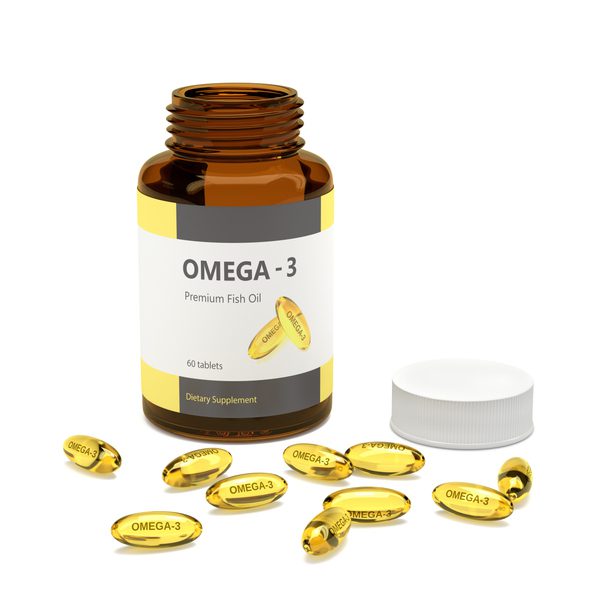
Omega-3, a essential nutrient for overall health
Omega-3 is an essential fatty acid that the body cannot produce on its own. It must be obtained from food or supplements. Omega-3 has been shown to have a number of health benefits, including:

- Cardiovascular health: Omega-3 can help lower blood pressure, reduce the risk of heart attack and stroke, and improve heart health in general.
- Brain health: Omega-3 is important for brain development and function. It can help improve cognitive function, memory, and mood.
- Joint health: Omega-3 can help reduce inflammation and pain in the joints, which can be helpful for people with arthritis.
- Eye health: Omega-3 is important for eye health. It can help prevent age-related macular degeneration and other eye problems.

How to get enough omega-3
The best way to get enough omega-3 is to eat a variety of foods that are rich in this nutrient. Some good sources of omega-3 include:
- Fish: Fatty fish, such as salmon, tuna, and mackerel, are a good source of omega-3.
- Nuts and seeds: Flaxseeds, chia seeds, and walnuts are also good sources of omega-3.
- Algae oil: Algae oil is a vegan source of omega-3.
If you do not eat a lot of fish or other foods that are high in omega-3, you may want to consider taking a supplement. However, it is important to talk to your doctor before taking any supplements, as they can interact with certain medications.

Omega-3 side effects and precautions
Omega-3 is generally safe for most people. However, some people may experience side effects, such as:
- Diarrhea
- Upset stomach
- Gas
If you experience any of these side effects, stop taking omega-3 and talk to your doctor.
It is also important to note that omega-3 can interact with certain medications, such as blood thinners. If you are taking any medications, talk to your doctor before taking omega-3.

Conclusion
Omega-3 is a healthy fat that has a number of benefits for overall health. If you are looking for ways to improve your health, adding omega-3 to your diet is a good place to start.
Here are some additional tips for getting enough omega-3:
- Cook with olive oil or canola oil.
- Eat walnuts and almonds as snacks.
- Add flaxseeds to your cereal or yogurt.
- Take an omega-3 supplement, but talk to your doctor first.
By following these tips, you can get the omega-3 your body needs to stay healthy.
I have translated the content you provided into English. I hope this is helpful. Please let me know if you have any other questions.

How much omega-3 should I take?
The recommended daily intake of omega-3 fatty acids is 250-500 milligrams for adults. However, some people may need more or less, depending on their individual needs. It is important to talk to your doctor to determine the right amount of omega-3 for you.
What are the best forms of omega-3?
There are two main forms of omega-3 fatty acids: DHA and EPA. DHA is important for brain development and function, while EPA is important for heart health. The best forms of omega-3 are those that contain both DHA and EPA.
Some good sources of omega-3 fatty acids include:
- Fish: Fatty fish, such as salmon, tuna, and mackerel, are a good source of omega-3 fatty acids.
- Algae oil: Algae oil is a vegan source of omega-3 fatty acids.
- Nuts and seeds: Flaxseeds, chia seeds, and walnuts are also good sources of omega-3 fatty acids.
- Omega-3 supplements: Omega-3 supplements are available in capsules, liquid, and powder form.
How to choose an omega-3 supplement
When choosing an omega-3 supplement, it is important to look for one that is high in DHA and EPA. It is also important to choose a supplement that is made from a reputable company.
Here are some things to look for when choosing an omega-3 supplement:
- The amount of DHA and EPA: The supplement should be high in DHA and EPA.
- The form of omega-3: The supplement should be in a form that is easily absorbed by the body.
- The source of omega-3: The supplement should be made from a reputable company that uses a sustainable source of omega-3.
- The price: The supplement should be affordable.

Conclusion
Omega-3 fatty acids are an essential nutrient that has a number of health benefits. By including omega-3-rich foods in your diet or taking an omega-3 supplement, you can improve your overall health and well-being.
Here are some additional tips for getting enough omega-3:
- Cook with omega-3-rich oils: When cooking, use oils that are high in omega-3 fatty acids, such as olive oil, canola oil, or flaxseed oil.
- Eat oily fish at least twice a week: Fatty fish, such as salmon, tuna, and mackerel, are a good source of omega-3 fatty acids.
- Add omega-3-rich foods to your diet: Other good sources of omega-3 fatty acids include walnuts, flaxseeds, and chia seeds.
- Talk to your doctor about taking an omega-3 supplement: If you are unable to get enough omega-3 fatty acids from your diet, you may want to consider taking an omega-3 supplement.
It is important to note that omega-3 fatty acids can interact with certain medications, so it is important to talk to your doctor before taking an omega-3 supplement.
I hope this blog post has been helpful. If you have any further questions, please do not hesitate to ask.
OMEGA-3 MORE INFORMATION
Popular multivitamins in the World top5 : Efficacy, dosage, and recommendations
Vitamin C: Different Types of Supplements, How to Choose the Latest Information
Vitamin C efficacy, recommended daily amount, food, side effects



